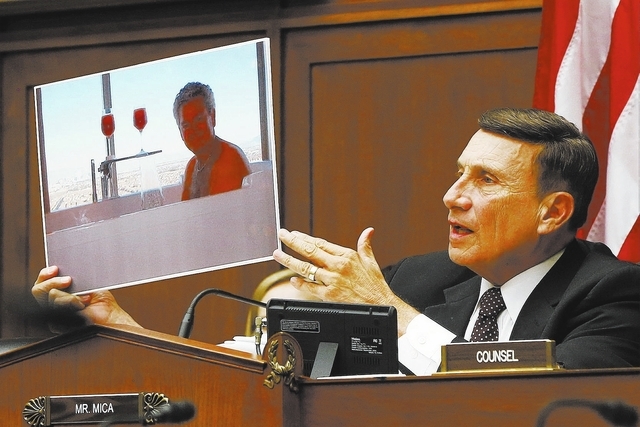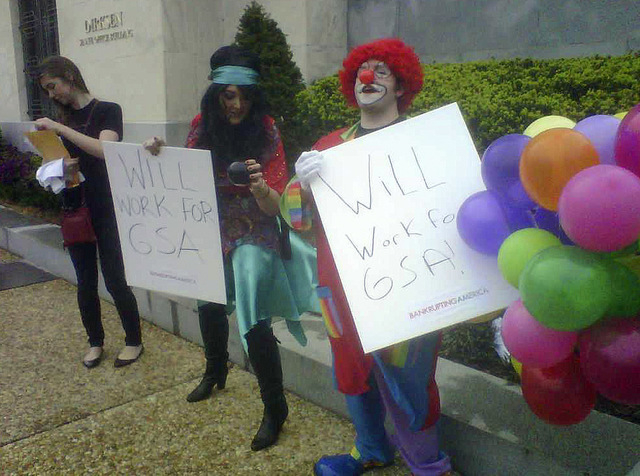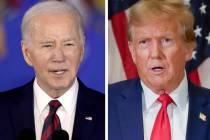Report refuels fears that feds blacklisting Las Vegas
WASHINGTON — Government agencies have cut travel spending more than $3 billion since scandal engulfed the General Services Administration over its $823,000 conference at the M Resort in Henderson three years ago, Congress was told Tuesday.
And while a White House official insisted there is no guidance to bureaucrats where they should hold their meetings, a recent analysis suggests Las Vegas and other resort cities are bearing the brunt of the cutbacks.
According to an analysis of travel records by USA Today, federal agencies have all but abandoned Las Vegas and other resort destinations for business meetings.
The government spent just $92,736 on hotel rooms in Las Vegas in fiscal 2013, which ended Sept. 30, down from nearly $2.5 million in 2010, the newspaper reported late last month. Contracts for hotel rooms were down 81 percent.
Likewise, hotel contracts for federal travel to Honolulu decreased 88 percent, while hotel room reservations were down 100 percent in Orlando, Fla., according to the newspaper.
At the same time, federal spending on hotel rooms in Washington, D.C., increased from $2.7 million in 2010 to $57.5 million in 2013, suggesting Beltway-based officials are holding get-togethers closer to home for colleagues from around the country.
The report has refueled fears that Las Vegas is being blacklisted in the wake of an over-the-top five-day conference the GSA Western Region held for 300 employees at the M Resort in October 2010.
Spending for the taxpayer-funded conference included $3,200 for a session with a mindreader, $5,600 for in-room parties and $3,700 for T-shirts. Videos taken at the conference showed attendees making fun of the spending. A photo of the GSA meeting organizer raising a glass of champagne while soaking in a hot tub in a resort suite crystallized the public’s perception of the event.
As the Senate convened a hearing Tuesday on conference spending, Sen. Harry Reid, D-Nev., said scrutiny of government spending is good, but “I am concerned about the informal blacklisting of specific conference locations based solely on their perception as resort destinations.”
At the hearing of the Senate Homeland Security and Government Affairs Committee, Chairman Tom Carper, D-Del., quizzed Beth Cobert, deputy director of the White House Office of Management and Budget, on Obama administration policy for meetings in resort cities.
“There is no guidance or regulation concerning conferences at resort locations,” Cobert responded.
“The decision criteria on where to hold a conference should be based on the cost of the conference and the travel to the conference. It should also be based on effectiveness of who you are trying to reach,” she said. “Those are the guidelines we want agencies to use.”
Cobert declined to talk with reporters as she left the hearing. The OMB did not respond to a further query about conference spending to resort cities.
A bill sponsored in the Senate by Nevada Sen. Dean Heller and in the House by the state’s lawmakers would prohibit policies banning agencies from holding meetings in Las Vegas and other desirable locales. It has yet to draw a hearing.
“Federal agencies have a responsibility to maximize taxpayer dollars when conducting official meetings, and no place provides greater value and convenience for business travelers than Las Vegas,” said Rep. Dina Titus, D-Nev.
The publicity surrounding the 2010 GSA conference in Henderson led inspectors across the government to scrutinize conference spending.
Among others, audits turned up questions surrounding a $4.1 million Internal Revenue Service conference in Anaheim, Calif., in 2010 that included agency workers performing in a Star Trek spoof video, and two human resources conferences totaling $6.1 million the Department of Veterans Affairs held in 2011 in Orlando.
In November 2011, the Obama administration required agencies to reduce spending by 20 percent in administrative accounts including travel and promotion. The next May, the Office of Management and Budget required a 30 percent cut in travel spending from 2010 levels.
“Our efforts are paying off,” Cobert told senators.
The Interior Department has cut back $99 million, the Department of Defense has saved $69 million, the Treasury Department has reduced costs $181 million, and the EPA has reduced travel spending by $35 million, she said.
Savings were achieved in some cases by replacing travel meetings with video-conferencing and webinars, using government space instead of hotels and scheduling meetings back to back to reduce travel costs.
Still, Sen. Tom Coburn, R-Okla., said he was concerned bureaucrats will return to free-spending ways when the spotlight on conferences gets turned off.
He said he tried to persuade the Department of Education to cancel a student aid training conference held last month at Mandalay Bay, and it refused. He said it cost “almost a million dollars.”
Coburn urged Congress to take up his bill, the Conference Accountability Act, that would direct agencies to make further cuts in conference spending.
The bill would prohibit an agency from spending more than $500,000 on any single conference and require all details about costs to be posted online, including numbers for travel, food, lodging and location scouting, as well as all speeches, exhibits and videos.
“I really don’t think the IRS employees would have made the Star Trek video had they known it was going up on IRS.Gov,” he said.
Contact Stephens Washington Bureau Chief Steve Tetreault at stetreault@stephensmedia.com or 202-783-1760. Follow @STetreaultDC on Twitter

See a YouTube video showing a GSA worker in a performance that poked fun at the waste in the agency.






























